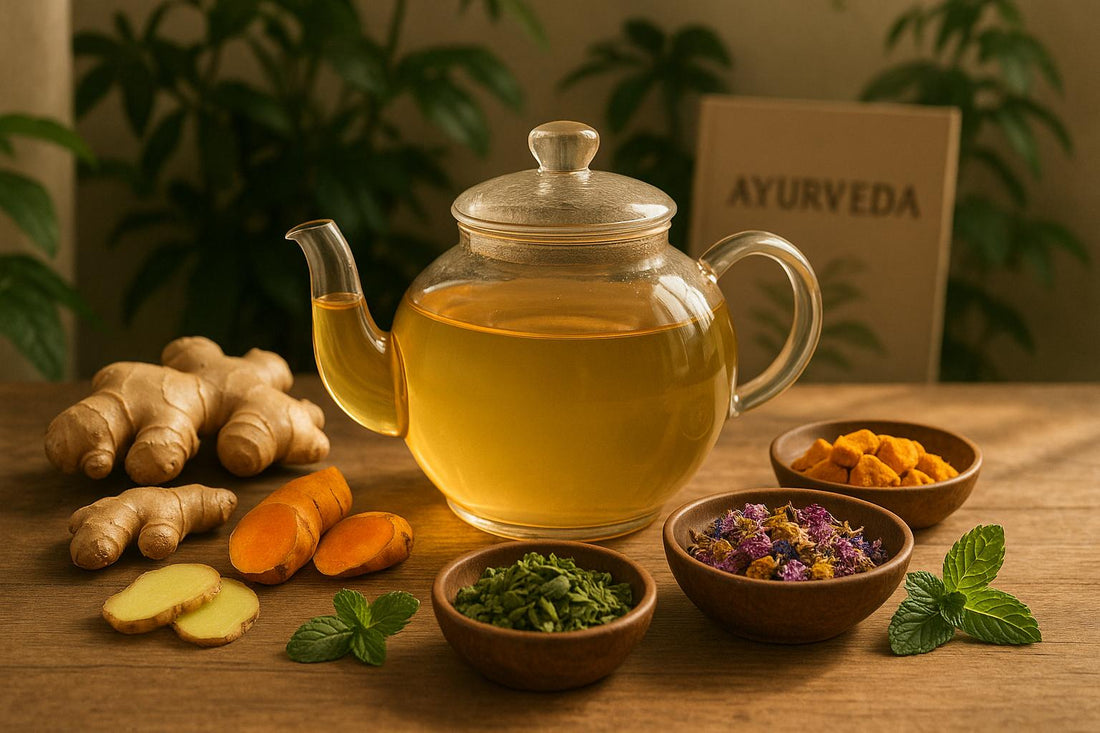
Ultimate Guide to Dosha Detox with Herbal Teas
Share
Dosha detox uses Ayurvedic principles to remove toxins and restore balance to your body through personalized techniques. Herbal teas play a key role by targeting the specific needs of the three doshas - Vata, Pitta, and Kapha - using carefully chosen herbs. These teas not only support digestion and detoxification but also promote mindfulness and relaxation.
Key Points:
- Vata: Needs warming and grounding herbs like ginger and cinnamon to calm the nervous system and improve digestion.
- Pitta: Benefits from cooling herbs like peppermint and fennel to reduce heat and inflammation.
- Kapha: Stimulated by warming and energizing herbs like turmeric and black pepper to boost metabolism and circulation.
Incorporating herbal teas into your daily routine - morning, midday, and evening - can help maintain balance. Pairing them with Ayurvedic practices like oil pulling and self-massage enhances the detox process. Supplements, such as those for liver and gut health, can further support your efforts.
Understanding Doshas and Their Detox Needs
The 3 Doshas Explained
Ayurvedic medicine is built on the concept that everything in nature is made up of five elements: space (aakash), air (vayu), fire (teja), water (jala), and earth (prithvi). These elements combine to form three vital energies, or doshas, that influence your body, mind, and emotions.
- Vata: A mix of air and space, Vata represents movement and communication. People with a dominant Vata are often slim, energetic, and quick thinkers. This dosha oversees essential functions like breathing, heartbeats, muscle contractions, and the nervous system's communication.
- Pitta: Made up of fire and water, Pitta governs digestion and transformation. Those with strong Pitta traits tend to have athletic builds and a driven, leadership-oriented mindset. It plays a role in metabolism, body temperature, and processing thoughts, emotions, and experiences.
- Kapha: A blend of earth and water, Kapha provides structure, stability, and lubrication. Kapha-dominant individuals usually have sturdy frames and nurturing, supportive personalities. This dosha supports immunity, lubricates joints, moisturizes the skin, and offers overall strength.
Your unique dosha composition - often with one or two being more dominant - shapes your physical traits, mental tendencies, and even your susceptibility to certain health issues. Understanding your dosha helps you recognize when something feels off.
Signs of Dosha Imbalance
Recognizing the signs of dosha imbalances is key to addressing them effectively. Stress, poor diet, environmental changes, or irregular routines can disrupt the natural balance of each dosha, leading to distinct symptoms.
- Vata Imbalance: Dry skin, constipation, joint stiffness, and feeling cold are common physical signs. Mentally, you may feel anxious, restless, or overwhelmed, with difficulty focusing. Emotionally, fear, loneliness, or exhaustion can surface.
- Pitta Imbalance: Symptoms include skin irritation, acid reflux, excessive hunger, and feeling overheated. Emotionally, this imbalance can cause irritability, impatience, and bursts of anger or jealousy. Perfectionism and competitiveness may also intensify.
- Kapha Imbalance: Physical signs include weight gain, sluggish digestion, excessive mucus, and a sense of heaviness or lethargy. Emotionally, Kapha's natural patience may shift into stubbornness, possessiveness, or resistance to change, sometimes leading to a lack of motivation or feelings of depression.
By paying attention to these signals, you can address imbalances early, preventing them from turning into more serious health concerns.
How Detox Balances Doshas
Detoxification in Ayurveda isn’t about harsh cleanses - it’s about removing ama, or toxins, that build up when doshas are out of balance. The focus is on strengthening your digestive fire (agni) and supporting your body’s natural elimination processes. Each dosha requires a tailored approach:
- Vata: When Vata is out of balance, grounding and nourishing techniques are key. Warm, moist foods and herbs help counter Vata's cold and dry nature. These practices help calm the nervous system and restore stability to irregular bodily functions.
- Pitta: For Pitta imbalances, cooling and soothing methods are essential. Cooling herbs and practices help reduce internal heat and inflammation, calming Pitta's intense and fiery tendencies.
- Kapha: Stimulating and energizing methods work best for Kapha imbalances. Warming spices and herbs boost circulation and metabolism, helping to move stagnant energy and flush out toxins.
This personalized approach ensures your detox aligns with your body’s needs, leading to better energy, digestion, and overall health.
| Dosha | Imbalance Signs | Detox Approach | Key Focus |
|---|---|---|---|
| Vata | Anxiety, dry skin, constipation, restlessness | Grounding and nourishing | Calm the nervous system, restore balance |
| Pitta | Irritability, acid reflux, skin inflammation, anger | Cooling and soothing | Reduce heat, calm intensity |
| Kapha | Weight gain, lethargy, excess mucus, stubbornness | Stimulating and energizing | Boost circulation, move stagnant energy |
Best Herbal Teas for Dosha Detox
Herbal teas are a simple yet effective way to address dosha imbalances by using plant-based ingredients that naturally warm, cool, stimulate, or calm the body. When tailored to your dosha's specific needs, these teas can aid detoxification, enhance digestion, and restore balance, making them a perfect addition to a holistic wellness routine.
These teas align with your body's natural rhythms, helping to eliminate toxins, boost energy, and support overall harmony. Let's explore the best herbs for each dosha and how they promote balance.
Herbs for Vata Balance
Vata types, with their airy and cold tendencies, benefit from herbs that provide warmth, stability, and nourishment. These herbs not only calm the nervous system but also support digestion and elimination.
- Ginger: Known for its warming and grounding properties, ginger helps ignite digestive fire and stabilize scattered energy. A cup of fresh ginger tea in the morning can set a grounded tone for the day and combat feelings of coldness.
- Cinnamon: This sweet, warming spice supports healthy blood sugar levels and circulation, areas where Vata types often struggle. An afternoon cinnamon tea can help prevent energy dips.
- Licorice Root: Acting as a natural adaptogen, licorice root replenishes depleted energy and provides a sweet, grounding effect. It's especially beneficial in the evening to promote restful sleep.
- Ashwagandha: Ideal for Vata individuals dealing with stress and anxiety, ashwagandha helps regulate cortisol levels and provides a calming, grounding effect. A pre-bedtime tea can improve sleep quality and reduce morning tension.
Herbs for Pitta Balance
Pitta's fiery nature thrives on cooling and soothing herbs that calm inflammation and reduce excess heat. These herbs are particularly helpful in managing both physical and emotional intensity.
- Peppermint: With its cooling menthol content, peppermint tea is perfect for reducing body heat and calming digestive inflammation. It's especially refreshing after meals or during hot weather.
- Coriander: This gentle cooling herb offers a slightly sweet flavor that soothes Pitta while aiding digestion. Coriander tea is effective for reducing acidity and inflammation in the digestive tract.
- Fennel: Combining cooling properties with digestive support, fennel tea helps with acid reflux and bloating, common issues for Pitta types. It's a great choice after dinner to prevent discomfort.
- Rose Petals: Rose tea not only cools physical heat but also helps ease emotional irritability and anger. Its sweet, calming energy is ideal during times of stress.
- Hibiscus: This tart, vibrant tea provides vitamin C, cools internal heat, and supports healthy blood pressure - beneficial for Pitta types prone to hypertension under stress.
Herbs for Kapha Balance
Kapha types, with their heavy and slow nature, benefit from stimulating and warming herbs that energize and break through stagnation. These herbs also support metabolism and help manage weight.
- Black Pepper: A pinch of black pepper in tea stimulates digestion and circulation, cutting through mucus and congestion often associated with Kapha imbalances.
- Clove: This aromatic spice provides warming energy that boosts circulation and combats sluggishness. Clove tea is especially helpful during cold, damp weather.
- Turmeric: Known for its anti-inflammatory and warming qualities, turmeric helps reduce joint stiffness and supports digestion. Golden milk made with turmeric is a nourishing option for Kapha types.
- Ginseng: This adaptogenic herb energizes both mind and body, making it a great morning tea to combat lethargy and mental fog.
- Cardamom: With its sweet, pungent aroma, cardamom tea lifts heavy moods and aids digestion, making it a wonderful choice for Kapha individuals struggling with emotional heaviness.
Making Herbal Tea a Ritual
Consistency and mindfulness are key when using these teas for dosha balance. Opt for high-quality, organic herbs, and take time to prepare and enjoy your tea. This simple ritual can help you reconnect with your body's natural wisdom and support your path to balance.
| Dosha | Primary Herbs | Key Benefits | Best Timing |
|---|---|---|---|
| Vata | Ginger, cinnamon, licorice, ashwagandha | Warming, grounding, calming the nervous system | Morning and evening |
| Pitta | Peppermint, coriander, fennel, rose, hibiscus | Cooling, soothing, calming emotions | After meals and during heat |
| Kapha | Black pepper, clove, turmeric, ginseng, cardamom | Stimulating, warming, boosting metabolism | Morning and sluggish periods |
Incorporate these herbal teas into your daily routine to support detoxification and maintain balance for your dosha type.
Adding Herbal Teas to Your Detox Routine
Incorporating herbal teas into your daily habits can naturally support your body’s detox processes. By choosing teas that suit your dosha type and adjusting your routine with the seasons, you can craft a ritual that nurtures your overall well-being. Let’s dive into how you can structure your day to make the most of these benefits.
Daily Tea Routines for Detox
A steady tea routine can help maintain a balanced digestive rhythm. Tailor your tea schedule to align with your dosha's natural tendencies:
- Morning: Start your day with a warm herbal tea to kickstart digestion. For a Vata constitution, opt for a warming blend. If you’re Pitta, go for a cooling infusion, and for Kapha, an energizing brew works best.
- Afternoon: A midday tea can support digestion after meals, helping you stay energized and balanced.
- Evening: End your day with a calming infusion to relax your body and prepare for restful sleep. Aim for moderately warm teas to aid digestion without overstimulating.
Seasonal Adjustments for Dosha Detox
Your tea routine doesn’t have to stay the same year-round. As the seasons change, so do your body’s needs. During cooler months or transitional periods, warming and grounding teas can help balance internal energy. In contrast, summer calls for cooling and hydrating blends to keep you refreshed. Adjust your tea choices to match the environment and your internal state.
Pairing Herbal Teas with Ayurvedic Practices
Herbal teas can become even more impactful when paired with other Ayurvedic techniques. Complement your tea ritual with practices like:
- Oil pulling: A cleansing technique to start the day.
- Self-massage (abhyanga): Using warm oils to ground and relax the body.
- Mindful eating: Paying attention to your meals to aid digestion.
- Deep breathing or yoga: A few minutes of focused breathing or gentle movement before or after your tea can enhance its calming effects.
Creating a distraction-free tea ritual allows you to fully immerse yourself in the experience - savoring the flavors, aromas, and warmth of your infusion. Start small and stay consistent, making adjustments as you observe how your body responds over time.
sbb-itb-9616115
Supporting Detox with Natural Supplements
Natural supplements can build on the detox benefits of dosha-specific herbal teas by targeting key detox pathways. Together, these two approaches can work hand-in-hand to support your body's natural cleansing processes.
Mahoney Supplements for Detox Support

Mahoney Supplements offers a range of products designed to aid detox and promote overall wellness. Their formulas emphasize natural ingredients to help balance digestion, support liver health, and strengthen the immune system.
- ParaGon: Priced at $104.95, this parasite cleanse formula is designed to promote gut health and maintain digestive balance - key elements of an effective detox routine.
- TUDCA & NAC: At $92.00, this supplement focuses on liver detox support. Considering the liver's vital role in eliminating toxins, this formula is crafted to help optimize liver function and aid recovery during detox.
- B17: Available for $102.95, this supplement is formulated to support immune health, an important factor as your body works to eliminate toxins and maintain overall wellness.
These supplements complement the ongoing benefits of herbal teas, creating a well-rounded detox routine.
Benefits of Combining Herbal Teas with Supplements
Herbal teas and natural supplements offer complementary benefits that enhance detox efforts. While herbal teas hydrate the body, aiding toxin removal and supporting lymphatic flow, supplements provide concentrated nutrients to target specific detox pathways, such as liver function and cellular cleansing.
Herbal teas work steadily throughout the day, offering consistent support, while supplements deliver a more concentrated, faster-acting boost. Together, they ensure continuous and balanced detoxification.
Herbal Teas vs. Supplements Comparison
The table below highlights the different roles of herbal teas and supplements in a detox routine:
| Aspect | Herbal Teas | Natural Supplements |
|---|---|---|
| Action Speed | Gradual effects over time | Faster, concentrated support |
| Dosage Control | Adjustable via brewing | Precise, standardized dosing |
| Convenience | Requires preparation | Quick and portable |
| Cost Range | $10–$30 per month | $25–$125 per product |
| Hydration Benefit | Significant fluid intake | Minimal hydration impact |
| Targeted Support | Broad, systemic wellness | Focused on specific organs or pathways |
Herbal teas provide steady, gentle detox support, while supplements offer targeted, high-impact assistance. By combining these approaches, you can maintain balanced detox support throughout the day.
For a well-rounded dosha detox routine, consider starting your day with a dosha-specific herbal tea, taking supplements during meals for optimal absorption, and winding down with a calming herbal blend in the evening. This layered approach ensures sustained support for your detox journey.
Achieving Balance Through Dosha Detox
Dosha detox focuses on tailoring cleansing methods to suit your unique body type, creating a pathway toward long-term health and vitality. By combining personalized herbal remedies with carefully chosen supplements, this approach builds a comprehensive foundation for well-being.
For Vata types, teas with warming and grounding properties help soothe the nervous system and bring calm. Pitta individuals benefit from cooling herbs that ease heat and reduce inflammation. Meanwhile, Kapha types thrive on stimulating and warming teas that support metabolism and circulation.
Herbal teas do more than just hydrate - they provide gentle, steady detox support throughout the day. Their slow-acting nature helps activate your body’s natural cleansing processes, making it easier to sustain these changes over time.
In addition to herbal teas, targeted supplements can take detox efforts to the next level. For example, Mahoney Supplements are designed to support specific areas like gut health, liver function, and the immune system. Together with your tea routine, these supplements create a well-rounded approach to wellness.
The secret to success lies in consistency and starting small. Swap your morning coffee for a tea that matches your dosha, then gradually add supplements and other Ayurvedic practices into your daily routine. Small, intentional steps make the journey manageable and effective.
Keep in mind that balance is not a one-time achievement - it’s an ongoing process. Seasonal changes, stress, and life events can all shift your dosha balance. By staying mindful of these shifts and adjusting your tea and supplement choices accordingly, you can help your body stay aligned and resilient.
Over time, these consistent practices can lead to noticeable benefits, such as increased energy, clearer skin, and better digestion. This blend of ancient Ayurvedic wisdom and modern natural health solutions offers a personalized path to wellness, honoring both your unique needs and your body’s ability to heal itself.
FAQs
How can I find my dominant dosha and customize my detox plan to suit it?
To figure out your dominant dosha in Ayurveda, you can take a quiz or consult with an Ayurvedic practitioner. Your dosha represents a blend of your physical characteristics, emotional patterns, and lifestyle habits, aligning with one of the three principles: Vata, Pitta, or Kapha.
Once you’ve identified your dosha, you can customize your detox plan. This might include selecting herbal teas that suit your needs, making dietary adjustments, and adopting lifestyle practices that bring balance to your dosha. A personalized approach like this helps support your health and fosters a sense of harmony between your body and mind.
What are some easy ways to add herbal teas to my daily routine for effective detox benefits?
Incorporating herbal teas into your daily life is both easy and enjoyable. Start your day with a warm cup to wake up your senses or have some before meals to support digestion. Need a little pick-me-up in the afternoon? Herbal tea can provide that gentle boost. And in the evening, it’s the perfect companion to help you relax and unwind.
To make it even more convenient, brew a larger batch and store it in the fridge so you can enjoy it chilled or reheated throughout the day. Pairing your tea habit with other healthy choices - like drinking plenty of water, eating nutritious meals, and staying active - can amplify its cleansing effects. The key is consistency. By making herbal tea a daily ritual, you can fully enjoy its benefits.
Can herbal teas and natural supplements work together to improve detoxification, and how does this combination help?
Combining herbal teas with natural supplements can give your body's natural detox systems a helpful boost. Teas like dandelion root, milk thistle, and red clover are celebrated for their ability to support liver function, cleanse the blood, and promote lymphatic drainage. These actions play an important role in removing toxins from the body.
When you pair these teas with supplements such as ParaGon (designed for parasite cleansing) or TUDCA & NAC (which aid liver detox and toxin removal), the benefits can be even greater. This duo works together to strengthen immune health, enhance liver performance, and support overall wellness. Incorporating both into your daily routine offers a more balanced, well-rounded approach to keeping your body clean and functioning at its best.
